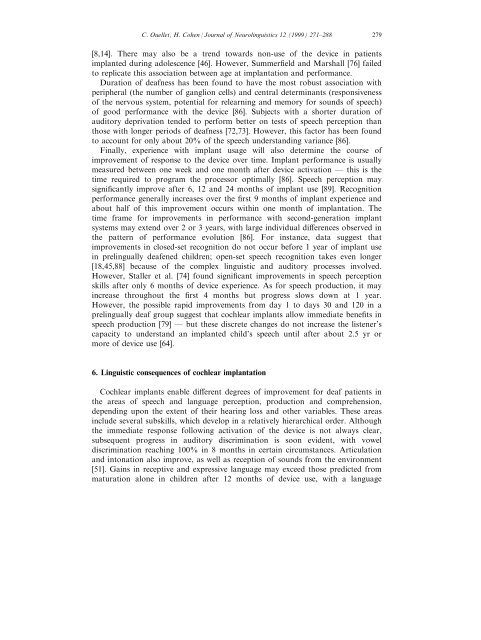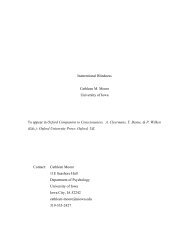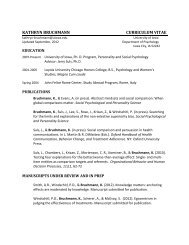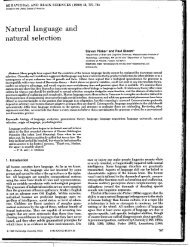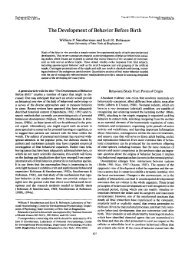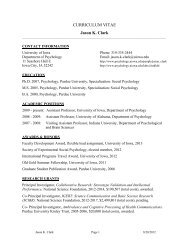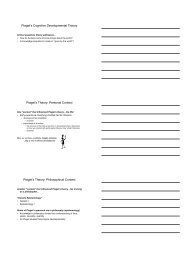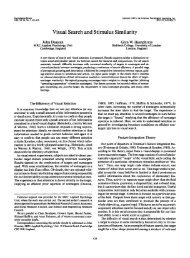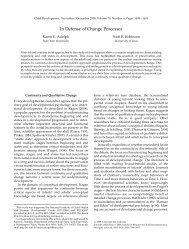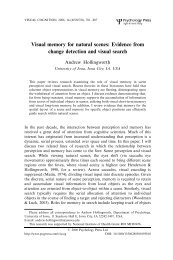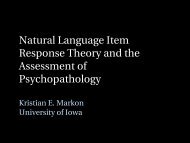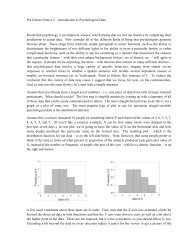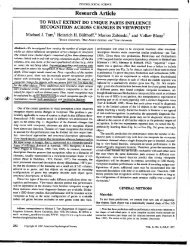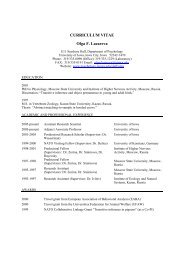Speech and language development following ... - ResearchGate
Speech and language development following ... - ResearchGate
Speech and language development following ... - ResearchGate
- No tags were found...
You also want an ePaper? Increase the reach of your titles
YUMPU automatically turns print PDFs into web optimized ePapers that Google loves.
C. Ouellet, H. Cohen / Journal of Neurolinguistics 12 (1999) 271±288 279[8,14]. There may also be a trend towards non-use of the device in patientsimplanted during adolescence [46]. However, Summer®eld <strong>and</strong> Marshall [76] failedto replicate this association between age at implantation <strong>and</strong> performance.Duration of deafness has been found to have the most robust association withperipheral (the number of ganglion cells) <strong>and</strong> central determinants (responsivenessof the nervous system, potential for relearning <strong>and</strong> memory for sounds of speech)of good performance with the device [86]. Subjects with a shorter duration ofauditory deprivation tended to perform better on tests of speech perception thanthose with longer periods of deafness [72,73]. However, this factor has been foundto account for only about 20% of the speech underst<strong>and</strong>ing variance [86].Finally, experience with implant usage will also determine the course ofimprovement of response to the device over time. Implant performance is usuallymeasured between one week <strong>and</strong> one month after device activation Ð this is thetime required to program the processor optimally [86]. <strong>Speech</strong> perception maysigni®cantly improve after 6, 12 <strong>and</strong> 24 months of implant use [89]. Recognitionperformance generally increases over the ®rst 9 months of implant experience <strong>and</strong>about half of this improvement occurs within one month of implantation. Thetime frame for improvements in performance with second-generation implantsystems may extend over 2 or 3 years, with large individual di€erences observed inthe pattern of performance evolution [86]. For instance, data suggest thatimprovements in closed-set recognition do not occur before 1 year of implant usein prelingually deafened children; open-set speech recognition takes even longer[18,45,88] because of the complex linguistic <strong>and</strong> auditory processes involved.However, Staller et al. [74] found signi®cant improvements in speech perceptionskills after only 6 months of device experience. As for speech production, it mayincrease throughout the ®rst 4 months but progress slows down at 1 year.However, the possible rapid improvements from day 1 to days 30 <strong>and</strong> 120 in aprelingually deaf group suggest that cochlear implants allow immediate bene®ts inspeech production [79] Ð but these discrete changes do not increase the listener'scapacity to underst<strong>and</strong> an implanted child's speech until after about 2.5 yr ormore of device use [64].6. Linguistic consequences of cochlear implantationCochlear implants enable di€erent degrees of improvement for deaf patients inthe areas of speech <strong>and</strong> <strong>language</strong> perception, production <strong>and</strong> comprehension,depending upon the extent of their hearing loss <strong>and</strong> other variables. These areasinclude several subskills, which develop in a relatively hierarchical order. Althoughthe immediate response <strong>following</strong> activation of the device is not always clear,subsequent progress in auditory discrimination is soon evident, with voweldiscrimination reaching 100% in 8 months in certain circumstances. Articulation<strong>and</strong> intonation also improve, as well as reception of sounds from the environment[51]. Gains in receptive <strong>and</strong> expressive <strong>language</strong> may exceed those predicted frommaturation alone in children after 12 months of device use, with a <strong>language</strong>


